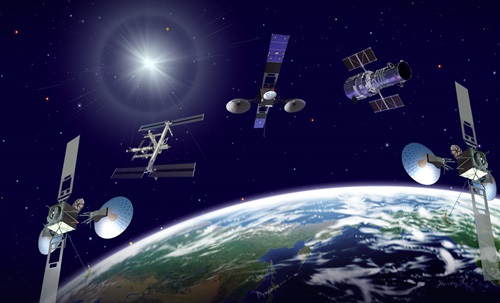Applied Space Systems Engineering – Online Short Course (June 10 - 13, 2024) 10 June - 13 June 2024 Online

Instructed by Teaching Science and Technology Inc. (TSTI)
- From June 10 - 13, 2024 (4 6-Hour Days, 24 Hours Total, Class Dates: 10, 11, 12, 13 June)
- 1100-1700 Eastern Time (0800-1400 Pacific Time)
- All students will receive an AIAA Certificate of Completion at the end of the course
OVERVIEW
Applied Space Systems Engineering examines the practical application of space systems engineering processes throughout the mission lifecycle. The course is aimed at developing the relevant knowledge and skills needed to apply systems engineering tools and techniques within a project environment to produce effective space systems. Using a combination of lectures, interactive discussions, and group exercises, the course presents a detailed review of all major systems engineering processes within three major categories: Design, Realization, and Systems Engineering Management. A detailed end-to-end space system case study is used to translate theory to practice by illustrating detailed how-to examples for achieving and establishing each major technical baseline throughout the mission lifecycle.
LEARNING OBJECTIVES
This course is aimed at giving you the knowledge, tools, and experience to enter any phase of the space mission life cycle and apply systems engineering processes to achieve practical results. At the end of this course, you should be able to:
- Define key systems engineering terms
- Explain fundamental systems engineering principles
- Apply systems engineering tools and techniques to solve specific design, manage, and realization challenges
- Develop relevant systems engineering artifacts for a given scenario that captures and communicates design, systems management, and system realization decisions
AUDIENCE
Systems engineers, payload principle investigators, subsystem engineers, or project managers who are involved in any phase of the space mission lifecycle.
Testimonials
"Emphasis on the 17 processes improved my understanding of how they fit into the project lifecycle.”–NASA Engineer
“I think the course was of great value and beneficial to my career. I think the value was more realized after the course”–NASA Engineer
“I enjoyed the instructor - he went out of his way to teach a few additional concepts to make sure we understood the material. He made the course interesting by inserting his own stories and experiences!” – NASA Engineer
“I am looking forward to becoming a more effective team member by implementing my new knowledge of the SE process.” – Astroscale Engineer
“I've seen a lot of this information in pieces over the years (30+). However, it was really nice to see it all together in one project, going from inception to devops. Having an example to work with was great! – NASA Engineer
COURSE FEES (Sign-In to Register)
- AIAA Member Price: $995 USD
- Non-Member Price: $1195 USD
- AIAA Student Member Price: $495 USD
Classroom Hours: 24 classroom hours / 2.4 CEU/PDH
Cancellation Policy: A refund less a $50.00 cancellation fee will be assessed for all cancellations made in writing prior to 14 days before the start of the event. After that time, no refunds will be provided.
Contact: Please contact Lisa Le or Customer Service if you have any questions about the course or group discounts.
Course Series: In Spring 2024, AIAA and TSTI are offering a series of courses focused on Space Systems Engineering. While courses are completely self-contained and can be taken on their own, those students wishing to deepen their knowledge may be interested in additional course study:
- Designing Systems
- Stakeholder Expectations and Requirements
- Operations Concept and Mission Architecture Development
- Technical Requirements Engineering
- Logical Decomposition & Physical Solutions
- Managing the System Engineering Processes
- Technical Planning
- Interface Management
- Risk Management
- Configuration & Technical Data Management
- Technical Decision Analysis
- Systems Engineering Management Planning
- Technical Reviews
- Realizing Systems
- System Implementation (buying/building/re-using)
- System Integration
- System Verification & Validation
- System Transition and DevOps
- Detailed End-to-End Case Study
- Hands-on Exercises
- The course lectures will be delivered via a Zoom virtual classroom. Connection information will be provided to registrants near the course start date. You can test your connection here: https://zoom.us/test
- Classes will not be recorded.
- Each registrant will receive a complete set of course notes with copies of all slides used in the presentations
- Between classes, the instructor will be available via email for technical questions and comments.
Dr. Jerry Jon Sellers, is the author of Understanding Space: An Introduction to Astronautics, and is a contributing author and editor of Applied Space Systems Engineering, author of the new chapter in ASSE on Applied Model-based Systems Engineering, as well as a contributing author of Human Spaceflight Analysis and Design. He has over 30 years of space systems experience including Guidance & On-board Navigation Officer in Space Shuttle Mission Control; Assistant Professor of Astronautics at the U.S. Air Force Academy; and Chief of Astronautics for the Air Force European Office of Aerospace Research & Development. He is an Associate Fellow at AIAA and the former Chairman of the AIAA Space Systems Technical Committee. He is an elected member of the International Academy of Astronautics and is a Certified Scaled-Agile Program Consultant. He is also an adjunct professor at Stevens Institute of Technology and certified Scaled-Agile Framework (SAFe) Program Consultant (SPC5). Jerry is an elected member of the International Academy of Astronautics.
AIAA Training Links
For information, group discounts,
and private course pricing, contact:
Lisa Le, Education Specialist (lisal@aiaa.org)
